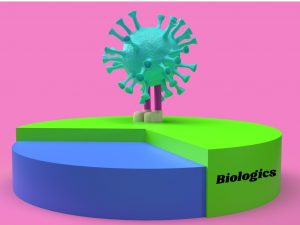Content Spotlight
Podcast: MilliporeSigma says education vital to creating unbreakable chain for sustainability
MilliporeSigma discusses the importance of people, education, and the benefits of embracing discomfort to bolster sustainability efforts.

Biologics now represent over half of Catalent’s revenues with the firm citing drug product manufacture as a major driver.
For a number of years, contract development manufacturing organization (CDMO) Catalent has been tipping the balance of its business away from its small molecule and delivery technology heritage, and towards its biologics business.
The biologics business pulled in around 32% of Catalent’s business mix in 2019, but in under two years the division pulled in over half of the CDMO’s net revenues for the third quarter FY21. In numbers, this represents $544 million for the three months ending March 31 – up 117% on the previous year – and 52% of a total $1.05 billion in net revenues.

Image: iStock/niphon
Like many in the life sciences service space, the pandemic has played its part in driving business at Catalent. The CDMO claims to have been awarded more than 80 COVID-19-related compounds by over 60 customers, including both Johnson & Johnson and Moderna’s respective vaccines.
“Given the wide range of growth rates among our four business segments due to the pandemic, our M&A activity and other factors, our business mix looks very different today than it did a year ago,” CEO John Chiminski said on a financial call.
“The effects of the pandemic cause some of these drivers to be even more pronounced in enhancing the growth of our biologics segment while also creating higher demand for the CDMO industry as a whole.”
While the biologics sector is broad – encompassing Catalent’s high demand cell and gene therapy capabilities along with more established antibody drug substance production – it is the CDMO’s drug product capacity that has been driving the division.
“From a just relative size standpoint, I would say our drug product is the most significant of our biologics revenues with drugs substance being a smaller component but obviously incredibly important,” Chiminski told stakeholders.
“Capacity specifically in a drug product area has been very-very tight throughout the entire pandemic,” he continued, adding “Catalent certainly has some very important assets from a drug product standpoint that have been used in the fight against COVID.”
Furthermore, he said COVID-19 has “not only accelerated our strategic plans, but also accelerated returns on the strategic investments we’ve made enabling us to put additional cash to work to continue to drive our long term growth.”
He cited the 950,000 square-foot facility in Bloomington, Indiana, acquired when Catalent bought Cook Pharmica for $950 million in 2017, as playing a critical role in COVID-19 vaccine production efforts. Catalent dedicated a high-speed vial filling line to Moderna in April at the site, which has five filling lines, including two added through a $100 million investment.
A 300,000 square-foot site in Anagni, Italy – bought from Bristol-Myers Squibb in 2019 – is also serving numerous COVID-19 projects.
“Looking back the $55 million purchase of the Anagni site, 16 months ago and our subsequent investments have quickly provided a critical component of the solution to the current global public health crisis while simultaneously creating meaningful value for our shareholders.”
As the firm looks to the future, Chiminski hinted that more acquisitions and expansions would be likely, both in drug product and drug substance, which he said was a smaller “but obviously incredibly important” component.
“We continue to look for good assets both in US and Western Europe with regards to drug products and drug substance.
“We certainly created a strong foothold now from a drug product standpoint in the Anagni facility that we purchased from BMS, but we certainly have our eyes set on also growing in sub- 5000 liter area in our existing assets as well as finding the right asset in Europe from an overall drug substance standpoint again.”
You May Also Like